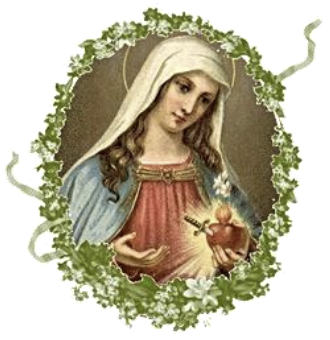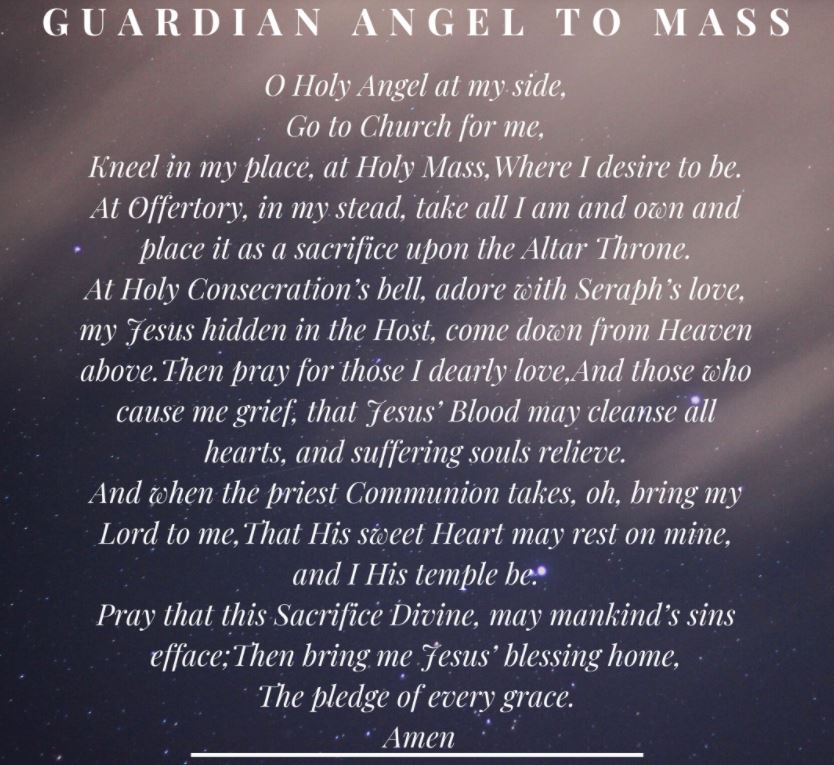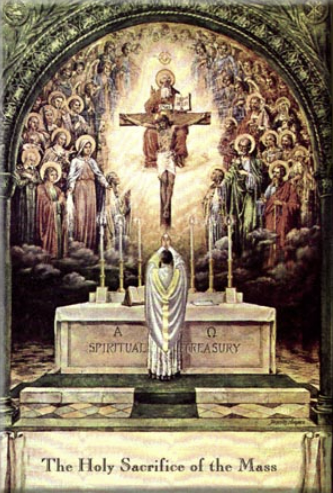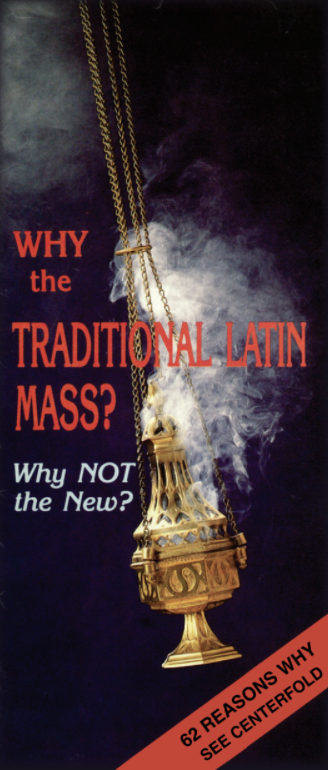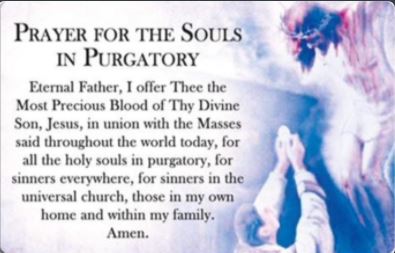|
|
 |
Sorrowful Heart of Mary Oratory
Society of Saint Pius X – Marian Corps
|
|
|
|
|
Et Resurrexit Tertia Die
If Christ be not risen again, your faith is vain; if the dead not rise again, neither is Christ risen again. – 1 Cor. xv:14
After having glorified the Lamb of God, and the Passover whereby Our Lord destroyed our enemies; after having celebrated our deliverance by water, and our entrance into the Promised Land; let us now fix our respectful gaze upon Him whose triumph is prefigured by all these prodigies. So dazzling is the glory that now beams from this Man-God that, like the prophet of Patmos, we shall fall prostrate before Him. But He is so wonderful, too, in his love, that He will encourage us to enjoy the grand vision. He will say to us, as He did to His disciple: Fear not! I am the First and the Last; and alive, and was dead; and behold! I am living for ever and ever, and have the keys of death and of hell.
Yes, He is now the Master of death, which had held Him captive; He holds in His hand the keys of hell. These expressions of Scripture signify that He has power over death and the tomb; He has conquered them. Now, the first use He makes of His victory is to make us partakers of it. Let us adore His infinite goodness; and, in accordance with the wish of Holy Mother Church, let us meditate upon the effects wrought in each one of ourselves by the Mystery of the Pasch.
The holy Angels, whose ranks are waiting to be filled up by the elect among men, are affectionately looking forward to that happy day, when the glorified bodies of the just will spring up, like the loveliest of earth’s flowers, to beauty the land of spirits. One of their joys consists in gazing upon the resplendent Bodies of Jesus and Mary – of Jesus, who, even as Man, is their King as well as ours, and of Mary, whom they reverence as their Queen. What a feast day, then, will they count that whereon we, their brothers and sisters, whose souls have long been their companions in bliss, shall be re-vested with the robe of flesh, sanctified and fitted for union with our radiant souls! What a canticle of fresh joy will ring through heaven, as it then receives within itself all the grandeur and beauty of creation! The Angels who were present at Jesus’ Resurrection were filled with admiration at the sight of his Body, which was indeed of a lower nature than themselves, but whose dazzling glory exceeded all the splendor of the angelic host together: will they not gladly hail our arrival after our resurrection? Will they not welcome us with fraternal congratulations when they see us, members as we are of this same risen Jesus, clad in the same gorgeous robe of glory as He who is their God?
The sensual man never gives a thought to the eternal glory and happiness of the body: he acknowledges the Resurrection of the flesh as an article of faith, but it is not an object of his hope. He cares but for the present; material, carnal pleasures being all he aspires to, he considers his body as an instrument of self gratification, which, as it lasts so short a time, must be the more quickly used. There is no respect in the love he bears to his body; hence he fears not to defile it; and after a few years of insult, which he calls enjoyment, it becomes the food of worms and corruption. And yet, this sensual man accuses the Church of being an enemy of the body! The Church that so eloquently proclaims its dignity and the glorious destiny that awaits it! He is the tyrant, and a tyrant is ever an impudent calumniator.
The Church warns us of the dangers to which the body exposes the soul; She tells us of the infectious weakness that came to the flesh by original sin; She instructs us as to the means we should employ for making it “serve justice unto sanctification;” but, far from forbidding us to love the body, She reveals to us a truth which should incite us to true charity, viz: that it is destined to endless glory and happiness. When laid on the bed of death, the Church honors it with the Sacrament of Extreme Unction, fitting it for immortality by anointing it with Holy Oil; She is present at the departure of the soul from this the companion of Her combats, and from which She is to be separated till the day of the general judgment; She respectfully burns incense over the body when dead; for, from this hour of its Baptism, She has regarded it as something holy; and to the surviving friends of the departed one, She addresses these inspired words of consolation: “Be not sorrowful, even as others, who have no hope!” But what is this hope? That same which comforted Job: “In my flesh, I shall see my God.”
Thus does our holy faith reveal to us the future glory of our body; thus does it encourage, by supernatural motives, the instinctive love borne by the soul for this essential portion of our being. It unites together the two dogmas: Our Lord’s Pasch, and the Resurrection of the Body. The Apostle assures us of the close relation that exists between them, and says: “If Christ be not risen again, your faith is vain; if the dead not rise again, neither is Christ risen again.”
So that Jesus’ Resurrection and our resurrection seem to be parts of one and the same truth. Hence, the sort of forgetfulness, which is nowadays so common, of this important Dogma of the Resurrection of the Body, is a sad proof of the decay of lively faith. Such people believe in a future resurrection, for the Creed is too explicit to leave room for doubt; but the hope which Job had is seldom the object of their thoughts or desires. They say that what they are anxious about, both for themselves and for those that are dear to them, is what will become of the soul after this life: they do well to look to this, but they should not forget what religion teaches them regarding the resurrection of the body; by professing it, they not only have a fresh incentive to virtue, but they also render testimony to the Resurrection of Jesus, whereby He gained victory over death both for Himself and for us. They should remember that they are in this world only to confess, by their words and actions, the truths that God has revealed. It is therefore not enough that they believe in the immortality of the soul; the Resurrection of the Body must also be believed and professed.
We find this article of our holy faith continually represented in the catacombs: its several symbols formed, together with the Good Shepherd, quite the favorite subject of primitive Christian art. In those early ages of the Church, when to receive Baptism was to break entirely with the sensuality of previous habits of life, this consoling Dogma of the Resurrection of the Body was strongly urged upon the minds of the neophytes. Any of them might be called upon to suffer martyrdom: the thought of the future glory that awaited their flesh inspired them with courage when the hour of trial came. Thus we read so very frequently in the Acts of the Martyrs how, when in the midst of their most cruel torments, that what supported them was the certain hope of the Resurrection of the Body. How many Catholics are there nowadays, who are cowardly in the essential duties of their state in life, simply because they never think of this important Dogma of their Faith!
The soul is more than the body; but the body is an essential portion of our being. It is our duty to treat it with great respect, because of its sublime destiny. If we, at present, chastise it and keep it in subjection, it is because its present state requires such treatment. We chastise it because we love it. The Martyrs and all the Saints loved their body far more than does the most sensual voluptuary: they, by sacrificing it, saved it; he, by pampering it, exposes it to eternal suffering. Let us be on our guard: sensualism is akin to naturalism. Sensualism will have it that there is no happiness for the body but such as this present life can give; and with this principle, its degradation causes no remorse. Naturalism is that propensity we have to judge of everything by mere natural light, whereas we cannot possibly know the glorious future for which God has created us except by faith. If, therefore, the Christian can see what the Son of God has done for our bodies by the divine Resurrection we are now celebrating, and feel neither love nor hope, he may be sure that his faith is weak; and if he would not lose his soul, let him henceforth be guided by the word of God, which alone can teach him what he is now, and what he is called to be hereafter. – Dom Guéranger, OSB
|
|
|
 |
Holy Mass Schedule
First Week After Easter
Today – Sunday, April 7th
Low Sunday
Holy Mass Streamed from UK – 5:00 AM EDT
Link Here
Wednesday, April 10th – 4:30 PM
Ferial
Thursday, April 11th – 7:30 AM
Saint Leo the Great, Pope, Confessor & Doctor
Friday, April 12th – 7:30 AM
Ferial
Saturday, April 13th – 8:00 AM
Saint Hermenegild, Martyr
Confessions / Rosary – 30 Minutes Before Mass
Oratory of the Sorrowful Heart of Mary
66 Goves Lane; Wentworth, NH 03282
|
|
|
 |
Low Sunday
Quasimodo Sunday
Because thou hast seen me, Thomas, thou hast believed: blessed are they that have not seen, and have believed. – John xx:29
THE OCTAVE OF THE PASCH
Our neophytes closed the Octave of the Resurrection yesterday. They were before us in receiving the admirable mystery; their solemnity would finish earlier than ours. This, then, is the eighth clay for us who kept the Pasch on the Sunday, and did not anticipate it on the vigil. It reminds us of all the glory and joy of that Feast of Feasts, which united the whole of Christendom in one common feeling of triumph. It is the day of light, which takes the place of the Jewish Sabbath. Henceforth, the first day of the week is to be kept holy. Twice has the Son of God honoured it with the manifestation of His almighty power. The Pasch, therefore, is always to be celebrated on the Sunday; and thus, every Sunday becomes a sort of Paschal Feast, as we have already explained in the Mystery of Easter.
Our Risen Jesus gave an additional proof of His wishing the Sunday to be, henceforth, the privileged day. He reserved the second visit He intended to pay to all His disciples for this the eighth day since His Resurrection. During the previous days, He has left Thomas a prey to doubt; but, to-day He shows Himself to this Apostle, as well as to the others, and obliges Him, by irresistible evidence, to lay aside His incredulity. Thus does our Saviour again honour the Sunday. The Holy Ghost will come down from heaven upon this same day of the week, making it the commencement of the Christian Church: Pentecost will complete the glory of this favoured day.
Jesus’ apparition to the Eleven, and the victory He gains over the incredulous Thomas, — these are the special subjects the Church brings before us today. By this apparition, which is the seventh since His Resurrection, our Saviour wins the perfect faith of His disciples. It was impossible not to recognize God, in the patience, the majesty, and the charity of Him who showed Himself to them. Here again, our human thoughts are disconcerted; we should have thought this delay excessive; it would have seemed to us, that our Lord ought to have, at once, either removed the sinful doubt from Thomas’ mind, or punished him for his disbelief. But no: Jesus is infinite wisdom, and infinite goodness. In His wisdom, He makes this tardy acknowledgment of Thomas become a new argument of the truth of the Resurrection; in His goodness, He brings the heart of the incredulous disciple to repentance, humility, and love, yea, to a fervent and solemn retractation of all his disbelief. We will not here attempt to describe this admirable scene, which holy Church is about to bring before us. We will select, for our today’s instruction, the important lesson given by Jesus to His disciple, and, through him, to us all. It is the leading instruction of the Sunday, the Octave of the Pasch, and it behooves us not to pass it by, for, more than any other, it tells us the leading characteristic of a Christian, shows us the cause of our being so listless in God’s service, and points out to us the remedy for our spiritual ailments.
Jesus says to Thomas: “Because thou hast seen me, thou hast believed: blessed are they that have not seen, and have believed!” Such is the great truth, spoken by the lips of the God-Man: it is a most important counsel, given, not only to Thomas, but to all who would serve God and secure their salvation. What is it that Jesus asks of His disciple ? Has He not heard him make profession that now, at last, he firmly believes? After all, was there any great fault in Thomas’ insisting on having experimental evidence before believing in so extraordinary a miracle as the Resurrection? Was he obliged to trust to the testimony of Peter and the others, under penalty of offending his divine Master? Did he not evince his prudence, by withholding his assent until he had additional proofs of the truth of what his Brethren told him? Yes, Thomas was a circumspect and prudent man, and one that was slow to believe what he had heard; he was worthy to be taken as a model by those Christians, who reason and sit in judgment upon matters of faith. And yet, listen to the reproach made him by Jesus. It is merciful, and, withal, so severe! This Jesus has so far condescended to the weakness of His disciple, as to accept the condition, on which alone he declares that he will believe: now that the disciple stands trembling before his Risen Lord, and exclaims, in the earnestness of faith: “My Lord! and my God!” oh! see how Jesus chides him! This stubbornness, this incredulity, deserves a punishment: — the punishment is, to have these words said to him: “Thomas! thou hast believed, because thou hast seen!”
Then, was Thomas obliged to believe before having seen? Yes, undoubtedly. Not only Thomas, but all the Apostles were in duty bound to believe the Resurrection of Jesus, even before He showed himself to them. Had they not lived three years with Him? Had they not seen Him prove himself to be the Messias and Son of God by the most undeniable miracles? Had He not foretold them, that He would rise again on the third day? As to the humiliations and cruelties of His Passion, had He not told them, a short time previous to it, that He was to be seized by the Jews, in Jerusalem, and be delivered to the Gentiles? that He was to be scourged, spit upon, and put to death? (Luke 18:32-33)
After all this, they ought to have believed in His triumphant Resurrection, the very first moment they heard of His Body having disappeared. As soon as John had entered the sepulchre, and seen the winding sheet, he at once ceased to doubt, he believed. But, it is seldom that man is so honest as this; he hesitates, and God must make still further advances, if He would have us give our faith! Jesus condescended even to this: He made further advances. He showed Himself to Magdalene and her companions, who were not incredulous, but only carried away by natural feeling, though the feeling was one of love for their Master. When the Apostles heard their account of what had happened, they were treated as women, whose imagination had got the better of their judgment. Jesus had to come in person: He showed Himself to these obstinate men, whose pride made them forget all that He had said and done, and which ought to have been sufficient to make them believe in His Resurrection. Yes, it was pride, for faith has no other obstacle than this. If man were humble, he would have faith enough to move mountains.
To return to our Apostle — Thomas had heard Magdalene, and he despised her testimony; he had heard Peter, and he objected to his authority; he had heard the rest of his fellow-Apostles and the two disciples of Emmaus, and no, he would not give up his own opinion. How many there are among us, who are like him in this! We never think of doubting what is told us by a truthful and disinterested witness, unless the subject touch upon the supernatural; and then, we have a hundred difficulties. It is one of the sad consequences left in us by original sin. Like Thomas, we would see the thing ourselves: that alone is enough to keep us from the fullness of the truth. We comfort ourselves with the reflection that, after all, we are Disciples of Christ; as did Thomas, who kept in union with his brother-Apostles, only he shared not their happiness. He saw their happiness, but he considered it to be a weakness of mind, and was glad that he was free from it!
How like this is to our modern rationalistic Catholic! He believes, but it is because his reason almost forces him to believe; he believes with his mind, rather than from his heart. His faith is a scientific deduction, and not a generous longing after God and supernatural truth. Hence, how cold and powerless is this faith! how cramped and ashamed! how afraid of believing too much! Unlike the generous unstinted faith of the saints, it is satisfied with fragments of truth, with what the Scripture terms diminished truths. (Psalm 11:2) It seems ashamed of itself. It speaks in a whisper, lest it should be criticized; and when it does venture to make itself heard, it adopts a phraseology, which may take off the sound of the divine. As to those miracles which it wishes had never taken place, and which it would have advised God not to work, they are a forbidden subject. The very mention of a miracle, particularly if it have happened in our own times, puts it into a state of nervousness. The lives of the saints, their heroic virtues, their sublime sacrifices — it has a repugnance to the whole thing! It talks gravely about those who are not of the true religion being unjustly dealt with by the Church in Catholic countries: it asserts that the same liberty ought to be granted to error as to truth: it has very serious doubts whether the world has been a great loser by the secularization of society.
Now, it was the for the instruction of persons of this class that our Lord spoke those words to Thomas: Blessed are they who have not seen, and have believed. Thomas sinned in not having the readiness of mind to believe. Like him, we also are in danger of sinning, unless our faith have a certain expansiveness, which makes us see everything with the eye of faith, and gives our faith that progress which God recompenses with a superabundance of light and joy. Yes, having once become members of the Church, it is our duty to look upon all things from a supernatural point of view. There is no danger of going too far, for we have the teachings of an infallible authority to guide us. The just man liveth by faith. Faith is his daily bread. His mere natural life becomes transformed for good and all, if only he be faithful to his Baptism. Could we suppose that the Church, after all her instructions to her neophytes, and after all those sacred rites of their Baptism which are so expressive of the supernatural life, would be satisfied to see them straightaway adopt that dangerous system which drives faith into a nook of the heart and understanding and conduct, leaving all the rest to natural principles or instinct? No, it could not be so. Let us, therefore, imitate St. Thomas in his confession, and acknowledge that, hitherto, our faith has not been perfect. Let us go to our Jesus, and say to him: “Thou art my Lord and my God! But, alas! I have many times thought and acted as though Thou wert my Lord and my God in some things, and not in others. Henceforth, I will believe without seeing; for I would be of the number of those whom Thou callest blessed!”
This Sunday, commonly called with us, Low Sunday, has two names assigned to it in the Liturgy: Quasimodo, from the first word of the Introit; and Sunday in albis (or, more explicitly, in albis depositis,) because it was on this day, that the neophytes assisted at the Church services attired in their ordinary dress. In the Middle-Ages, it was called Close-Pasch, no doubt in allusion to its being the last day of the Easter Octave. Such is the solemnity of this Sunday, that not only is it of a Greater Double rite, but no Feast, however great, can ever be kept upon it.
EPISTLE
Lesson of the Epistle of Saint John the Apostle – Chapter V
Dearly beloved: Whatsoever is born of God, overcometh the world: and this is the victory which overcometh the world, our faith. Who is he that overcometh the world, but he that believeth that Jesus is the Son of God? This is he that came by water and blood, Jesus Christ: not by water only, but by water and blood. And it is the Spirit which testifieth, that Christ is the truth. And there are three who give testimony in heaven, the Father, the Word, and the Holy Ghost. And these three are one. And there are three that give testimony on earth: the spirit, and the water, and the blood: and these three are one. If we receive the testimony of men, the testimony of God is greater. For this is the testimony of God, which is greater, because he hath testified of his Son. He that believeth in the Son of God, hath the testimony of God in himself. He that believeth not the Son, maketh him a liar: because he believeth not in the testimony which God hath testified of his Son.
The Apostle St. John here tells us the merit and power of faith: it is, says he, a victory, which conquers the world, both the world outside, and the world within us. It is not difficult to understand why this passage from St. John’s Epistles should have been selected for to-day’s Liturgy: it is on account of its being so much in keeping with the Gospel appointed for this Sunday, and in which our Lord passes such eulogy upon faith. If, as the Apostle here assures us, they overcome the world who believe in Christ, they have not sterling faith, who allow the world to intimidate their faith. Let us be proud of our faith, esteeming ourselves happy that we are but little children when there is question of our receiving a divine truth; and let us not be ashamed of our eager readiness to admit the testimony of God. This testimony will make itself heard to our hearts, in proportion to our willingness to hear it. The moment John saw the winding-bands which had shrouded the Body of his Master, he made an act of faith; Thomas, who had stronger testimony than John, (for he had the word of the Apostles, assuring him that they had seen their Risen Lord,) refused to believe: he had not overcome the world and its reasonings, because he had not faith.
GOSPEL
Sequel of the holy Gospel according to John – Chapter XX
At that time: When it was late that same day, the first of the week, and the doors were shut, where the disciples were gathered together, for fear of the Jews, Jesus came and stood in the midst, and said to them: Peace be to you. And when he had said this, he shewed them his hands and his side. The disciples therefore were glad, when they saw the Lord. He said therefore to them again: Peace be to you. As the Father hath sent me, I also send you. When he had said this, he breathed on them; and he said to them: Receive ye the Holy Ghost. Whose sins you shall forgive, they are forgiven them; and whose sins you shall retain, they are retained. Now Thomas, one of the twelve, who is called Didymus, was not with them when Jesus came. The other disciples therefore said to him: We have seen the Lord. But he said to them: Except I shall see in his hands the print of the nails, and put my finger into the place of the nails, and put my hand into his side, I will not believe. And after eight days again his disciples were within, and Thomas with them. Jesus cometh, the doors being shut, and stood in the midst, and said: Peace be to you. Then he saith to Thomas: Put in thy finger hither, and see my hands; and bring hither thy hand, and put it into my side; and be not faithless, but believing. Thomas answered, and said to him: My Lord, and my God. Jesus saith to him: Because thou hast seen me, Thomas, thou hast believed: blessed are they that have not seen, and have believed. Many other signs also did Jesus in the sight of his disciples, which are not written in this book. But these are written, that you may believe that Jesus is the Christ, the Son of God: and that believing, you may have life in his name.
We have said enough about St. Thomas’ incredulity; let us now admire his faith. His fault has taught us to examine and condemn our own want of faith; let us learn from his repentance how to become true believers. Our Lord, who had chosen him as one of the pillars of His Church, has been obliged to treat him with an exceptional familiarity: Thomas avails himself of Jesus’ permission, puts his finger into the sacred wound, and immediately he sees the sinfulness of his past incredulity. He would make atonement, by a solemn act of faith, for the sin he has committed in priding himself on being wise and discreet: he cries out, and with all the fervor of faith: My Lord and my God! Observe, he not only says that Jesus is his Lord, his Master, the same who chose him as one of His disciples: this would not have been faith, for there is no faith where we can see and touch. Had Thomas believed what his brother Apostles had told him, he would have had faith in the Resurrection; but now he sees, he has experimental knowledge of the great fact; and yet, as our Lord says of him, he has faith. In what? In this, that his Master is God. He sees but the Humanity of Jesus, and he at once confesses Him to be God. From what is visible, his soul, now generous and repentant, rises to the invisible: “Thou art my God!” Now, O Thomas! thou art full of faith! The Church proposes thee to us, on thy Feast, as an example of faith. The confession thou didst make on this day is worthy to be compared with that which Peter made, when he said, “Thou art Christ, the Son of the living God!” By this profession, which neither flesh nor blood had revealed to him, Peter merited to be made the Rock whereon Christ built His Church: thine did more than compensate thy former disbelief; it gave thee, for the time, a superiority over the rest of the Apostles who, so far at least, were more taken up with the visible glory than with the invisible Divinity of their risen Lord.
The Liturgical Year by Dom Guéranger
|
|
|
|
|
|
|
|
